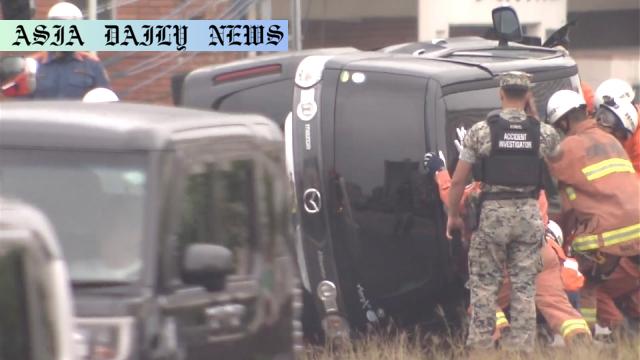hit-and-run: Okinawa police arrested a 20-year-old US Marine for an alleged hit-and-run that injured four, including two children.
hit-and-run incident in Okinawa involving a US Marine.
Alleged drunk-driving accident left 4 people injured.
Suspect fled the scene but was arrested shortly after.

US Marine Arrested After Hit-and-Run in Okinawa
On Sunday morning, a shocking event unraveled in the streets of Naha City, Okinawa, Japan. A hit-and-run crash allegedly involving a U.S. Marine stationed at Camp Hansen left four individuals, including two young children, injured. The local police acted quickly in apprehending the suspect, Marine Lance Corporal Ivan Garciamartinez, who reportedly abandoned the vehicle after the collision and fled on foot in nearby areas.
Eyewitnesses recounted harrowing moments as the crash took place around 10:30 a.m. The victim vehicle carried four passengers: a 7-year-old boy, a 10-year-old girl, and two adults, all of whom suffered minor injuries. Although the physical damages caused by the accident were not life-threatening, the emotional toll experienced by the victims is immeasurable.
Breaching Trust: Alcohol as a Contributing Factor
The circumstances surrounding the hit-and-run raise broader concerns about accountability and trust. According to local police, the marine’s blood alcohol level was found to be approximately double the legal limit. This startling revelation indicates that irresponsible behavior and impaired judgment potentially led to the accident.
The suspect, while admitting to causing the crash, denied failing to provide first aid at the scene. However, accounts from the victims and the lack of immediate action post-collision suggest otherwise. Incidents like these exacerbate pre-existing tensions between U.S. military personnel stationed in Okinawa and the local Japanese population, where past controversies and misconduct have strained relations significantly.
Broader Implications and Questions of Accountability
This hit-and-run case highlights the pressing need for more stringent monitoring and responsibilities for military personnel stationed overseas. Although law enforcement acted efficiently in locating and arresting Lance Corporal Garciamartinez within an hour, questions remain about the underlying causes of such behavior.
Alcohol impairment among off-duty personnel poses long-term concerns about the well-being and safety of the host communities. It’s worth mentioning that similar incidents in the past have led to reinforced callings for stricter regulation and supervision regarding the behavior of foreign servicemen stationed in Okinawa.
Conclusion: Building Toward a Safer Future
As the investigation into the incident continues, this case serves as a stark reminder for both the local authorities and the military entities involved. The victims deserve not just justice but systemic changes to prevent similar incidents in the future. Cooperation between Okinawan authorities and U.S. military officials will be paramount to rebuilding trust and ensuring security within local communities.
This tragedy underscores the importance of accountability, responsible drinking, and respect for local safety regulations—a duty that every individual, regardless of origin, must uphold while living abroad or serving their nation.
Commentary
A Tragic Event That Raises Concerns
The recent hit-and-run incident involving U.S. Marine Lance Corporal Ivan Garciamartinez in Okinawa is disturbing on multiple levels. While the minor physical injuries of the four victims, including two young children, might suggest a fortunate outcome, the psychological scars on those involved and their families cannot be underestimated. The actions in this case ripple far beyond the immediate aftermath and point directly toward deeper issues of accountability for foreign servicemen stationed in Japan.
The Role of Responsibility in Military Representation
The U.S. military’s presence in Okinawa has long been a considerably complex topic, characterized by mutual cooperation but also marred by incidents of misconduct. Events like this serve to undermine the trust that should exist between the local community and the stationed personnel. Drinking and driving point to a lack of awareness and responsibility that must be addressed urgently through stricter discipline measures and robust educational programs for those serving abroad.
Broader Impacts on Local Relations
From a broader perspective, this case adds fuel to an already sensitive relationship between the U.S. military and Okinawan residents. Incidents, especially those involving disregard for local laws and safety measures, unfortunately reinforce negative stereotypes and exacerbate community tensions. Proactively tackling such problems by implementing preventive measures could go a long way in regaining the community’s trust.
Hope for Systematic Improvement
While it is easy to focus on the immediate repercussions of the incident, this should serve as a call to action for systematic changes. Authorities on both sides must collaborate to ensure stricter monitoring, education, and accountability among personnel stationed overseas. Transparency and communication with the affected community can play a crucial role in mending trust.
In conclusion, such incidents should be seen not only as isolated events but also as opportunities for introspection and reform. The safety and security of local communities must always remain a priority.


